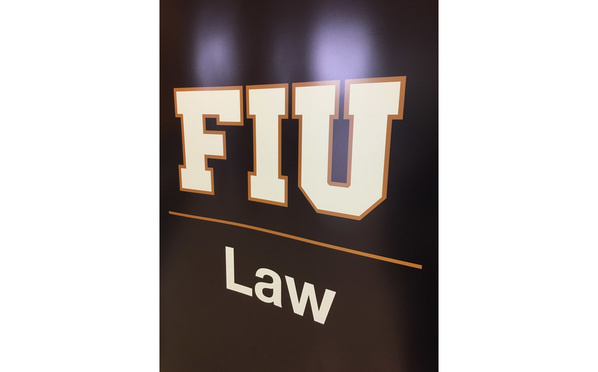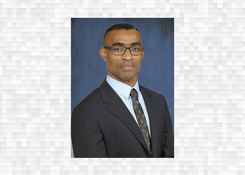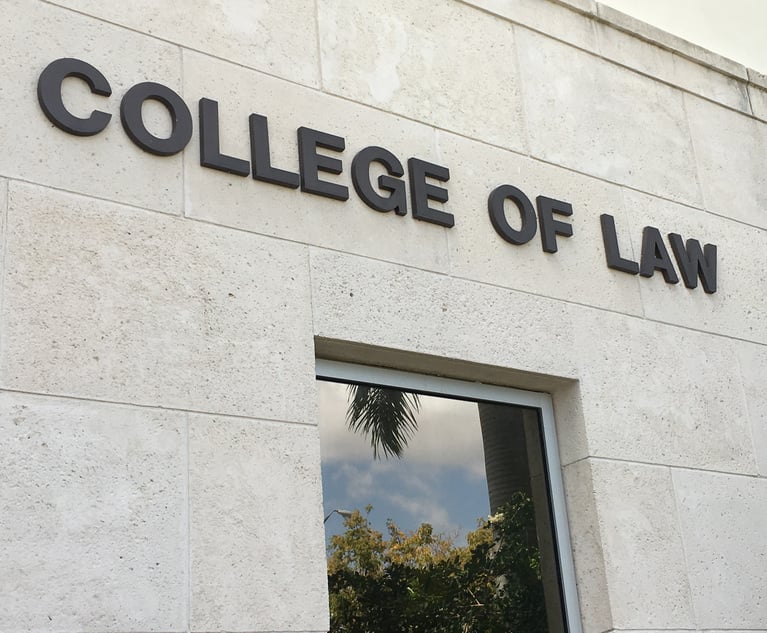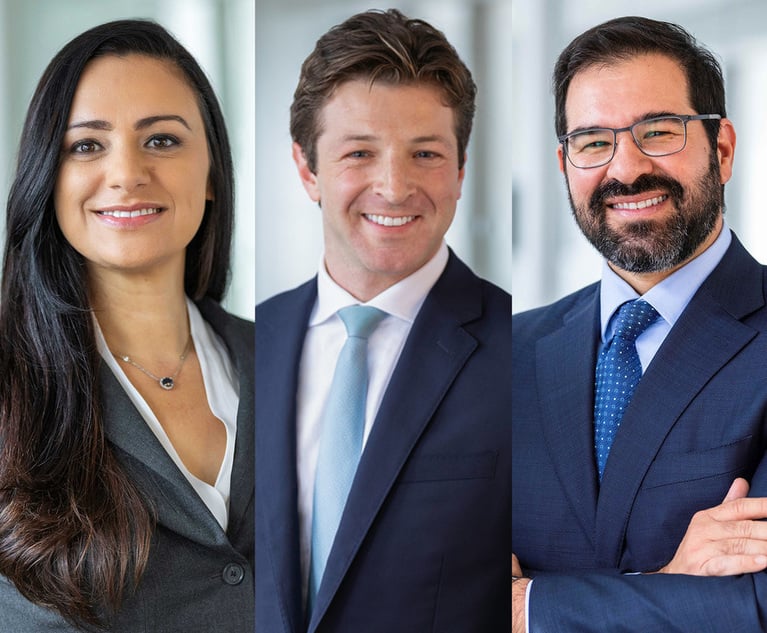Why FIU Dominates the Florida Bar Exam
Eighty-five percent of FIU's first-time test takers sitting the bar exam in February passed.
April 18, 2018 at 01:04 PM
5 minute read

When it comes to earning the top spot for performance on the Florida Bar exam, the secret's in the hands-on training.
At least that's how Florida International University acting law dean Tawia B. Ansah explains FIU's No. 1 ranking, outpacing all others as the school with the highest percentage of first-time candidates succeeding on the bar exam.
“You can take really good bar-prep courses … but if the leadup to that isn't sufficient, it's going to show up in the results,” said Ansah, a Columbia University graduate who teaches contracts, international business transactions, conflict of laws, professional responsibility and jurisprudence/legal theory. “I think our students are doing well on the bar because they're learning how to write well and communicate well, and they're learning communication skills throughout the program.”
Eighty-five percent of FIU's first-time test takers passed the February exam, according to the results the Florida Board of Bar Examiners released Monday. Last year, 87.8 percent passed the July exam, which has a much larger pool.

At the heart of FIU's law curriculum is its mandatory legal skills and values program with three prongs over three semesters.
Marketing materials describe it as a “simulated law-practice environment” — a key component of student success, according to Ansah.
The goal: teach written and oral communications skills, research techniques, ethics and client
relations.
In the first semester, students assume the role of legal interns. They research civil and criminal legal issues, draft predictive office memoranda and supplement that work with an oral report to a faculty member acting as a supervising attorney.
In the second term, the focus shifts to advocacy.
“'They get much more into the real nitty-gritty of law practice,” Ansah said.
Students gain practical experience by preparing a pretrial motion memorandum,
researching and drafting a multi-issue appellate brief and then presenting oral argument to a three-judge panel of practicing attorneys. The attorney-judges critique each argument.
By the third semester, the simulation casts students as practicing attorneys, tasked with representing a client from the inception of a legal problem to its resolution. It requires them to draft client and demand letters, prepare contracts and other transactional documents, negotiate with other “attorneys,” and draft pleadings, motions and supporting memoranda.
All stages require students to apply the bar's professionalism rules.
“The idea is they don't just go into a law firm with a head full of legal writing but no knowledge on how to execute that,” Ansah said. “If you're given that sort of preparation, then a bar exam is just one more thing along the way.”
University officials also attribute the success to an “Academic Excellence Program” by a faculty that includes Professors Louis Schulze and Raul Ruiz. They offer training on legal reasoning, analysis and writing, and help students apply those skills the bar exam.
The payoff is almost immediate.
About 87 percent of FIU's 2017 graduates found full-time, long-term employment within months, according to the university's submission to the American Bar Association's Section of Legal Education and Admissions to the Bar.
Most new graduates work in small Florida firms with two to 10 attorneys, and about 28 percent take public-sector jobs, according to the filing.
“A school does many things to prepare itself, not only for success on the bar but success in the bar,” Ansah said.
Other institutions saw room for improvement and acknowledged the need for more structure.
The University of Florida Levin College of Law, for instance, came in last on the February exam with a 31.8 percent success rate. A statement attributed to its dean, Laura A. Rosenbury, called the “shocking” results “a clear wake-up call.”
“The results are utterly unacceptable given the caliber of our students and the quality of their education,” according to the email. “The efforts we undertook prior to the February bar exam were clearly insufficient. We will be increasing the support we provide to the students taking the July 2018 bar exam. We have a long tradition at UF Law of respecting our students' autonomy and control over the courses they take. Given these shocking and disheartening results, we are rethinking this approach and doubling down on our intervention strategy.”
FIU has about a 30 percent acceptance rate, enrolling 147 students in its October 2016-2017 first-year class, according to details in the Miami public university's mandatory public disclosures. Its incoming class typically has undergraduate GPAs of 3.65 and a 156 score — on a scale of 120 to 180 — on the standardized Law School Admission Test.
Most succeeded on their first attempt at the exam, which in February felled nearly 40 percent of all candidates looking to practice law in Florida, according to data from the state Supreme Court.
FIU beat out the University of Miami, which took second place in July with an 84.2 percent pass rate, and Florida State University, which came in third with 83.9 percent, as 3,247 applicants sat for the summer test.
FIU typically vies with the private UM for top pass rates, but the latest round of scores showed UM tied for fourth place with Stetson University.
This content has been archived. It is available through our partners, LexisNexis® and Bloomberg Law.
To view this content, please continue to their sites.
Not a Lexis Subscriber?
Subscribe Now
Not a Bloomberg Law Subscriber?
Subscribe Now
NOT FOR REPRINT
© 2025 ALM Global, LLC, All Rights Reserved. Request academic re-use from www.copyright.com. All other uses, submit a request to [email protected]. For more information visit Asset & Logo Licensing.
You Might Like
View All
Florida Law Schools Are Seeing a Bump in Applications for 2025, After Recent Declines at Flagship Schools
3 minute read
Florida Judge Denies Motion to Dismiss in $150M Plane Crash Lawsuit Involving Flow La Movie
3 minute read
Trending Stories
- 1States Accuse Trump of Thwarting Court's Funding Restoration Order
- 2Microsoft Becomes Latest Tech Company to Face Claims of Stealing Marketing Commissions From Influencers
- 3Coral Gables Attorney Busted for Stalking Lawyer
- 4Trump's DOJ Delays Releasing Jan. 6 FBI Agents List Under Consent Order
- 5Securities Report Says That 2024 Settlements Passed a Total of $5.2B
Who Got The Work
J. Brugh Lower of Gibbons has entered an appearance for industrial equipment supplier Devco Corporation in a pending trademark infringement lawsuit. The suit, accusing the defendant of selling knock-off Graco products, was filed Dec. 18 in New Jersey District Court by Rivkin Radler on behalf of Graco Inc. and Graco Minnesota. The case, assigned to U.S. District Judge Zahid N. Quraishi, is 3:24-cv-11294, Graco Inc. et al v. Devco Corporation.
Who Got The Work
Rebecca Maller-Stein and Kent A. Yalowitz of Arnold & Porter Kaye Scholer have entered their appearances for Hanaco Venture Capital and its executives, Lior Prosor and David Frankel, in a pending securities lawsuit. The action, filed on Dec. 24 in New York Southern District Court by Zell, Aron & Co. on behalf of Goldeneye Advisors, accuses the defendants of negligently and fraudulently managing the plaintiff's $1 million investment. The case, assigned to U.S. District Judge Vernon S. Broderick, is 1:24-cv-09918, Goldeneye Advisors, LLC v. Hanaco Venture Capital, Ltd. et al.
Who Got The Work
Attorneys from A&O Shearman has stepped in as defense counsel for Toronto-Dominion Bank and other defendants in a pending securities class action. The suit, filed Dec. 11 in New York Southern District Court by Bleichmar Fonti & Auld, accuses the defendants of concealing the bank's 'pervasive' deficiencies in regards to its compliance with the Bank Secrecy Act and the quality of its anti-money laundering controls. The case, assigned to U.S. District Judge Arun Subramanian, is 1:24-cv-09445, Gonzalez v. The Toronto-Dominion Bank et al.
Who Got The Work
Crown Castle International, a Pennsylvania company providing shared communications infrastructure, has turned to Luke D. Wolf of Gordon Rees Scully Mansukhani to fend off a pending breach-of-contract lawsuit. The court action, filed Nov. 25 in Michigan Eastern District Court by Hooper Hathaway PC on behalf of The Town Residences LLC, accuses Crown Castle of failing to transfer approximately $30,000 in utility payments from T-Mobile in breach of a roof-top lease and assignment agreement. The case, assigned to U.S. District Judge Susan K. Declercq, is 2:24-cv-13131, The Town Residences LLC v. T-Mobile US, Inc. et al.
Who Got The Work
Wilfred P. Coronato and Daniel M. Schwartz of McCarter & English have stepped in as defense counsel to Electrolux Home Products Inc. in a pending product liability lawsuit. The court action, filed Nov. 26 in New York Eastern District Court by Poulos Lopiccolo PC and Nagel Rice LLP on behalf of David Stern, alleges that the defendant's refrigerators’ drawers and shelving repeatedly break and fall apart within months after purchase. The case, assigned to U.S. District Judge Joan M. Azrack, is 2:24-cv-08204, Stern v. Electrolux Home Products, Inc.
Featured Firms
Law Offices of Gary Martin Hays & Associates, P.C.
(470) 294-1674
Law Offices of Mark E. Salomone
(857) 444-6468
Smith & Hassler
(713) 739-1250







